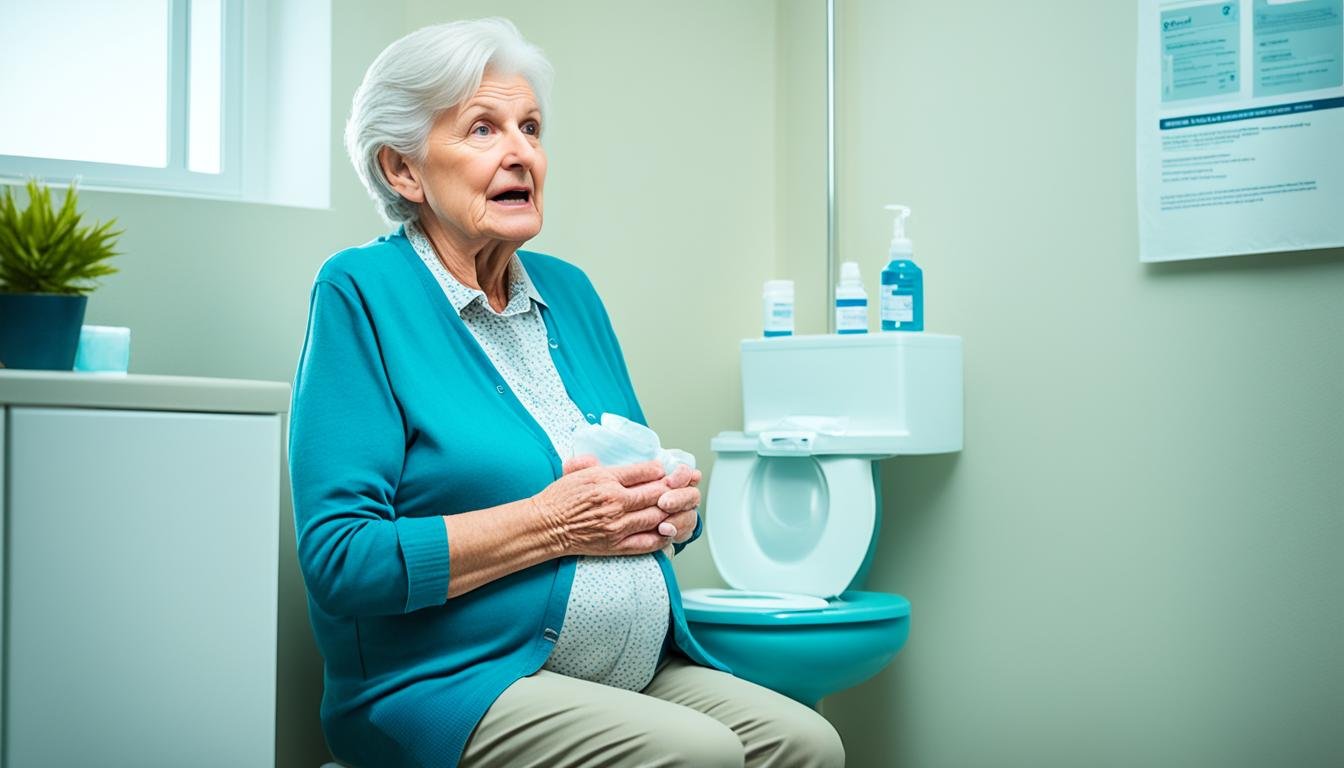Many women face the sudden urge to pee with pain and a burning sensation. These signs point to a possible UTI, a type of infection. UTIs are very common in women, especially after they go through menopause. Why do UTIs happen more often after menopause? But, remember, older women aren’t to blame. A drop in a hormone called estrogen is usually the cause after menopause.1 Estrogen keeps the vagina and urethra in good shape, preventing infections. But when it’s low, these areas can become dry and more prone to infection.1
The absence of estrogen also affects the good bacteria in the vagina and bladder.1 With less estrogen, there are fewer good bacteria around to stop infections.
Key Takeaways
- UTIs are more common in older women, especially after menopause due to estrogen loss.
- Estrogen helps maintain healthy urinary tract tissues and beneficial bacteria to prevent infections.
- Recurrent or chronic UTIs are a significant issue, defined as 3 or more UTIs per year.
- Vaginal estrogen therapy can reduce UTI risk by over 75% in postmenopausal women.
- Preventive antibiotics may be prescribed to manage recurrent UTIs in older adults.
Hormonal Changes and UTIs in Older Women
Older women face a higher risk of UTIs due to hormonal shifts after menopause.1 Declining estrogen levels cause the tissues in the vagina and urethra to change. This change makes the areas thin, dry, and prone to irritation. This makes UTIs more likely.1
Role of Estrogen Loss in UTI Risk
The drop in estrogen levels post-menopause significantly raises UTI chances.1 Estrogen is key to keeping the vagina and urethra tissues elastic and moist. Its loss can lead to thinning, drying, and increased vulnerability to UTIs.1
Impact on Urinary Tract Tissues
With lower estrogen, the urinary tract tissues get thinner and dryer.1 This makes the area more welcoming to harmful bacteria. As a result, the risk of UTIs goes up for older women.1
Estrogen’s Effect on Beneficial Bacteria
Estrogen is also vital for keeping good bacteria in the vagina and bladder. These bacteria fight off the bad ones that cause UTIs.1 But, after menopause, lower estrogen levels mean less of these protectors. This makes women more vulnerable to UTIs.1
Why Do Older Women Get UTI?
As we age, our bodies change, making us more prone to UTIs. One big change is weaker muscles in our bladder and pelvic floor. This can lead to problems like holding urine or leaks.2 When urine sticks around, bacteria can start to grow, causing an infection.2 Plus, our immune system weakens as we grow older, which doesn’t help in fighting UTIs.2 For women, their body shape and lower estrogen levels after menopause make them more likely to get a UTI than men.3
Weaker Bladder and Pelvic Floor Muscles
Bladder control and pelvic floor muscles can get weaker with age. This can lead to issues like holding in urine or not being able to control when it comes out. Bacteria find this a cozy spot to grow, possibly causing UTIs.2
Incontinence and Urine Retention
Keeping urine in the bladder for a long time lets bacteria thrive, increasing UTI risks.2 Incontinence issues, which are more common as we get older, might also help bacteria enter the urinary tract.3
Compromised Immune Function
Our body’s defense system tends to become weaker with age, putting us at higher risk of different infections, including UTIs.2 This makes it harder for us to fight bad bacteria in the urinary tract.2
Common UTI Symptoms in Elderly Women
Older women often show classic UTI signs. This includes pain when urinating and the constant urge to pee. They might feel like their bladder is always full.4 Yet, the signs can be less typical for those with dementia. They may act more confused or out of sorts, rather than complain about their pee.5 So, spotting a UTI in these patients is harder.
Classic Urinary Symptoms
The usual UTI signs are clear in older women. They experience pain or burn when they pee, want to go often, and feel like they’ve never fully emptied their bladder.4 It’s critical to notice these common signs fast. This knowledge helps in getting quick UTI care for the elderly.
Atypical Symptoms in Dementia Patients
With age and dementia, UTI signs may change. Instead of the classic problems, like urinary issues, confusion or odd behavior might show.5 This makes doctors’ job harder. They must always suspect a UTI, especially in those with memory issues. A full check is necessary to catch it.
Asymptomatic UTIs in Older Adults
An asymptomatic UTI happens when there are germs in the urinary tract. But the person doesn’t feel any symptoms. These UTIs are found when checking without a reason and may not need treatment. This is unless the person is expecting a baby, had recent surgery in that area, or often gets UTIs.67
Research tells us that 10% to 42% of older women might have these germs in their urine without symptoms. Also, about 25% of very old women may have a UTI problem.7 Older age, health issues, and living in care homes increase the chances of having these hidden UTIs.7
Deciding to give antibiotics for these cases isn’t easy. Some studies don’t find a link between a possible infection and falls in nursing home residents.7 Also, checking the urine may not clearly show what’s really making elderly individuals feel unwell in care homes.7 Doctors need to think carefully about treating these hidden UTIs with antibiotics.7
Because these hidden UTIs are so common in older people, doctors need to be very watchful. They should not just treat based on finding germs in the urine. Instead, they should watch for any changes in the person’s health and how they look.7
Diagnosis and Treatment of UTIs in the Elderly
If an older adult might have a UTI, a doctor will do tests to check. They use a urine culture to find out which bacteria is causing the UTI. This test helps pick the best antibiotic to use.8
Diagnostic Tests and Evaluations
Besides a urine culture, other tests might be done. Doctors could look inside the bladder with a small camera or use an ultrasound to check the kidneys. These tests are common if the UTIs happen a lot or if they’re complicated.9
Antibiotic Therapy
In older patients with a UTI, doctors will likely start treatment with specific antibiotics. The goal is to pick the right one without adding to the problem of antibiotic resistance. Usually, these antibiotics are taken for no more than 7 days to lower the chance of resistance. It’s also important for the patient to drink plenty of water. This helps remove bacteria from the urinary tract.8
Management of Recurrent UTIs
If UTIs keep coming back, more steps might be taken to stop them. This could involve estrogen therapy to improve the urinary tract’s health. Or, the doctor could suggest taking a low dose of antibiotics to prevent future infections.9 A personalized approach and close monitoring are key in care for the elderly with UTIs.9
Prevention of UTIs in Aging Females
After menopause, women have a higher chance of getting UTIs. This is because their body changes with age.1 Yet, there are many ways to stop UTIs in older women and keep their bladders healthy.
Vaginal Estrogen Therapy
Vaginal estrogen, in the form of creams, tablets, or rings, is very helpful. These treatments can make the vagina and urethra stronger, lowering infection risk.1 Research indicates that using estrogen after menopause can cut UTI risk by more than 75% in 6 to 12 weeks.1
Low-Dose Antibiotic Prophylaxis
If UTIs happen often for someone, a doctor might recommend antibiotics regularly.1 Taking a small dose of these drugs for six months or more can make UTIs occur less often.
Lifestyle and Hygiene Measures
Changing some habits can also prevent UTIs. It’s important to drink lots of water, go to the bathroom often, and keep clean down there.6 Some research shows that taking D-Mannose might help the elderly avoid UTIs, and it’s safe.6
Combining these methods can lower the chance of getting UTIs again for older women. It helps keep their bladder in good shape and their life quality high.1106
UTI Risk Factors in Postmenopausal Women
As women get older, their chance of UTIs can go up. Conditions like diabetes and kidney disease might hit their immune system hard.1 This makes it easier for UTIs to happen. Also, not being able to control urine, which is common, can let bacteria into the bladder.11
Diabetes and Kidney Disease
Women after menopause, with diabetes or kidney issues, face a higher UTI risk.1 These health problems lower the body’s infection-fighting power. This lets bacteria grow in the urinary tract more easily.
Urinary Incontinence
Problems like leaking urine can make postmenopausal women more likely to get UTIs.11 When the bladder doesn’t empty all the way, it creates a spot for bacteria to grow. This can lead to UTIs happening more often.
Genetic Predisposition
It’s also possible for some women to be more likely to get UTIs because of their genes.11 Genetic differences might increase the risk, even if there are no other health dangers present.
Complications of Untreated UTIs in the Elderly
UTIs left untreated in the elderly can be serious. They may lead to kidney infections and even renal failure.2 The infection might spread to the bloodstream, causing sepsis, which can be life-threatening.4 Early diagnosis and treatment are key to avoid these dangers.
Kidney Infection and Renal Failure
If UTIs are not treated, they might result in a kidney infection. This injury to the kidneys can lead to a fatal condition called renal failure.2 Timely medical care helps prevent such severe outcomes and protects the elderly’s kidney health.
Sepsis and Life-Threatening Infections
Without treatment, a UTI can move to the blood and cause sepsis.4 Sepsis is a medical crisis needing urgent care. It can lead to organ failure and even death if not handled quickly.4 Signs of sepsis include a quick heart rate, fever, confusion, and trouble breathing.
Older women prone to bladder infections are at higher risk of kidney issues from UTIs.4 Several reasons, like immune system weakness, structural changes in the urinary tract, chronic illnesses, and antibiotic resistance, increase the risk of recurrent UTIs in the elderly.4
Impact of UTIs on Quality of Life in Older Women
Recurrent or chronic urinary tract infections (UTIs) greatly affect the lives of older women. They disrupt daily life, cause physical pain, and bring emotional stress.10 Symptoms such as frequent urination, a burning feeling, and overall uneasiness make it hard for them to stay independent and enjoy social activities.12 Problems like cystitis and not responding well to antibiotics lower their quality of life even more.12
Recurrent lower UTIs are known to take a toll on a patient’s life quality.10 Findings from a 2018 online study pointed out the heavy social and financial cost of these infections. This affects how well people can live their lives.10 A study of 504 women over 85 years old found that UTI diagnosis led to much lower PGCMS (Philadelphia Geriatric Center Morale Scale) scores. This suggested a significant hit on morale and general well-being for the very old women.12
Quality of life looks at physical, mental, and social well-being.12 Recurrent UTIs, with all their related discomfort and issues, can deeply affect older women’s health.10 It’s vital to focus on preventing, diagnosing, and treating UTIs in this group. Doing so would improve their lives and help them stay independent.12
Antibiotic Resistance and UTIs in Aging Populations
The rise of antibiotic-resistant bacteria is a big worry for UTIs, especially for the elderly.10 Doctors need to choose wisely when giving out antibiotics. They should pick the smallest dose for the least time. This helps in not making the problem worse.10 Checking regularly is key to see if the antibiotics still work against UTIs in older folks.10
Judicious Use of Antibiotics
Using antibiotics right is really important. This is extra true for older adults’ UTIs.10 Doctors should only use antibiotics that hit the exact target, for the shortest time possible. This lessens how fast resistant bacteria can spread. And this is good news for keeping older people’s bladders healthy.10
Emerging Antibiotic-Resistant Strains
The older the population gets, the more we see these hard-to-fight UTIs.10 It’s important to keep a close eye on these UTIs to spot any new resistance. This way, doctors can change how they treat these infections to stay ahead.10 Taking steps early to stop resistant strains is crucial for dealing with UTIs in the elderly.10
Seeking Medical Advice for Recurrent UTIs
Older women facing recurring UTI symptoms should see a doctor.4 In America, over 3 million UTI cases are reported yearly. Seniors might even need hospital care for UTIs with severe symptoms.4 Getting quick diagnosis and treatment helps avoid complications and keeps life quality high.
When to See a Doctor
Don’t put off telling your doctor about possible UTI signs if you’re older.4 UTIs can lead to kidney infections in 1 out of 30 cases. Plus, over 1.7 million Americans get sepsis yearly, with UTIs being a culprit. Acting fast can stop the problem from getting worse.
Importance of Prompt Treatment
Quickly treating UTIs in older adults is key to avoid serious issues like kidney problems and sepsis.4 Seniors might need to go to the hospital for UTI testing and care because of their symptoms. By seeing a doctor early and sticking to the treatment, older women can keep the effects of recurring UTIs at bay.
UTIs in Older Men: Risk Factors and Management
UTIs hit older women more often, but older men deal with them too. A key risk for UTIs in men as they age is enlarged prostates. This condition, known as benign prostatic hyperplasia (BPH), is quite common.7
The bigger prostate can block normal urination. This leads to not fully emptying the bladder. Such a situation encourages bacterial growth, setting the stage for a UTI.7
Prostate Enlargement and UTI Risk
Prostate enlargement is a key issue for UTI risk in elderly men. The blockage it causes in the urine flow leads to frequent urine that doesn’t clear the bladder fully. This situation is perfect for bacteria to grow and cause UTIs.7
Treating the prostate problem is crucial to reduce UTI risk in older men. It’s a vital step in their UTI care.7
Uncircumcised Men and UTIs
For older men, being uncircumcised is another UTI risk.7 The foreskin can house bacteria. This can later pass to the urinary tract, upping the infection risk.7
Good hygiene for uncircumcised men is critical. It’s key for stopping UTIs from coming back.7
Dealing with UTIs in older men sometimes needs special steps. This includes treating prostate issues and using different treatment paths than for women.7 Doctors must spot and tackle UTI risks in these men. This helps make sure their UTIs are managed well.
Conclusion
Urinary tract infections (UTIs) are common among older women. They face these issues because of changes in hormones and their bodies as they age.13 It’s key to grasp the main causes. These include lower estrogen levels affecting the urinary system and useful bacteria. By knowing these reasons, dealing with UTIs in the elderly becomes easier.13 Older women are more prone to UTIs due to issues like weaker bladder and pelvic muscles, incontinence, and a weaker immune system.13
Spotting UTI symptoms can be tricky, especially in the elderly. It’s crucial for older women to see a doctor quickly when they notice something wrong. This way, they can avoid serious problems like kidney infections.10 Using preventive methods is also smart. Things like vaginal estrogen therapy, taking low-dose antibiotics regularly, and staying clean can cut the risk of UTIs. This improves bladder health and quality of life in aging women.10
The fight against antibiotic resistance in UTI treatment is ongoing, notably in the elderly. A careful use of antibiotics is needed.13 Seeing older women’s special needs, health experts are focusing on better UTI management and prevention. This aims to boost the well-being and freedom of older adults.10
FAQ
Why do older women get UTIs more often?
What other factors contribute to UTIs in older women?
What are the common symptoms of UTIs in elderly women?
What is an asymptomatic UTI?
How are UTIs in the elderly diagnosed and treated?
What can be done to prevent UTIs in older women?
What are the risk factors for UTIs in postmenopausal women?
What are the potential complications of untreated UTIs in the elderly?
How do UTIs impact the quality of life for older women?
How does antibiotic resistance affect the treatment of UTIs in the elderly?
When should an older woman seek medical attention for a suspected UTI?
Are older men also at risk for UTIs?
Source Links
- https://www.acog.org/womens-health/experts-and-stories/the-latest/utis-after-menopause-why-theyre-common-and-what-to-do-about-them
- https://www.urologygroup.com/4-complications-of-utis-among-older-women/
- https://www.bannerhealth.com/healthcareblog/better-me/the-risk-of-utis-as-you-age
- https://allianceurology.com/complications-of-utis-in-older-women/
- https://www.ncbi.nlm.nih.gov/pmc/articles/PMC9827929/
- https://consultqd.clevelandclinic.org/the-truth-about-utis-in-older-adults
- https://www.ncbi.nlm.nih.gov/pmc/articles/PMC3878051/
- https://www.healthline.com/health/uti-in-elderly
- https://www.ncbi.nlm.nih.gov/pmc/articles/PMC5873814/
- https://www.ncbi.nlm.nih.gov/pmc/articles/PMC7357682/
- https://pubmed.ncbi.nlm.nih.gov/28364867/
- https://www.ncbi.nlm.nih.gov/pmc/articles/PMC2920245/
- https://www.ncbi.nlm.nih.gov/pmc/articles/PMC4194886/




